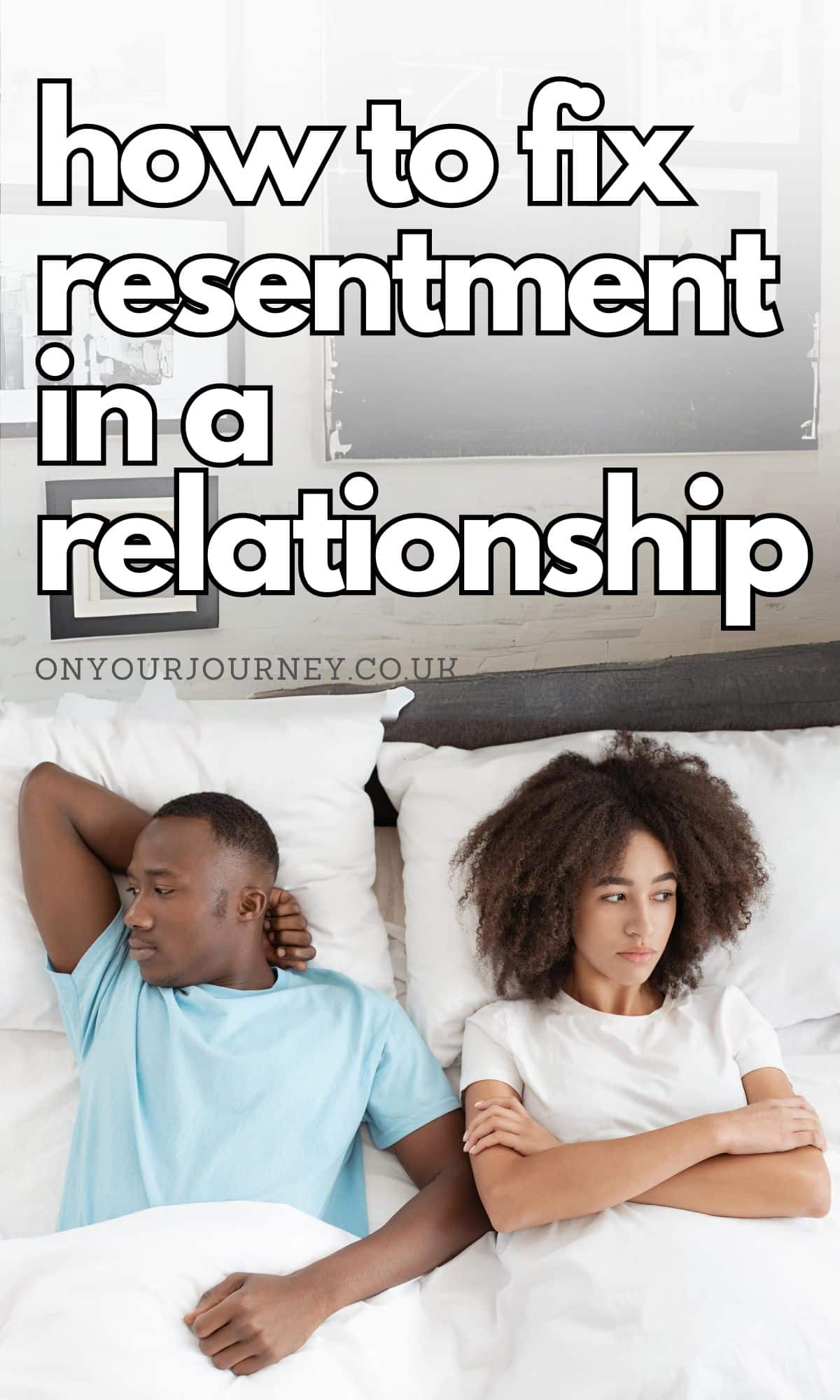Resentment in marriage or relationship can feel like a heavy stone in your heart, weighing down the joy and love that once flowed so freely between you and your partner. But here’s the good news: it’s not necessarily the end of the road.
This emotion, though intense and sometimes overwhelming, doesn’t have to spell the demise of your union. Rather, it’s a signal, a nudge towards growth and deeper understanding.

Let’s start on this journey of healing together, transforming resentment into a bridge back to love and mutual respect.
Recognizing the Signs of Resentment is The First Step to Healing it
Feelings of resentment don’t emerge out of nowhere. They simmer, stewing over time, often stemming from unmet needs, lack of communication, or feeling undervalued.
You might notice the little things irking you more, or a sense of emotional distance creeping in. These are the signs of resentment, whispering to you that it’s time to pay attention, to listen deeply not just to your own feelings but also to your partner’s.
Taking this first step towards healing involves not only recognizing the signs but also understanding that resentment, much like a silent alarm, signals deeper issues that need addressing.
It’s a call to action, urging you to engage in honest and open dialogue with your partner. This journey of healing starts with both of you sitting down, laying the cards of your emotions on the table, and navigating through them with empathy and patience.
While these conversations may be challenging, they hold the potential to transform your relationship, clearing the fog of misunderstanding and rekindling the warmth of mutual respect and love.

Understanding the Roots and Common Causes of Resentment in Marriage or a Relationship
Resentment often finds fertile ground in relationships when our expectations don’t match reality.
Perhaps it’s the division of household chores, or maybe it’s the emotional support you crave but aren’t receiving. Both of these are some of the most common reasons.
Unrealistic expectations can also lead us down this path, painting a picture of how we believe our partner should act, rather than embracing who they truly are. Recognizing these common causes is like shining a light in the dark corners of your relationship, allowing you to see clearly what needs to be addressed.
Resentment can also stem from harboring negative emotions over a long time, often due to unresolved conflicts or feeling that your own needs are perpetually sidelined. It’s not uncommon for one partner to feel like they are doing more than their fair share, leading to feelings of bitterness.
These feelings can be further complicated if past experiences, like issues with a family member or a work colleague, bleed into the dynamics of the marriage, setting off a vicious cycle of resentment.
Recognizing these patterns is crucial, as it’s the only way to break down the emotional wall that separates you from your partner.

Creating Space for Healing & Letting Go of Resentment
Healing is a process, a journey back to a healthy relationship. It begins with creating a safe space for both you and your partner to express your feelings without fear of judgment or reprisal.
This is where effective communication becomes your most powerful tool. It’s about sharing not just your negative feelings but also your needs, desires, and fears.
Remember, it’s not just about airing your own grievances; it’s equally important to be a compassionate listener, understanding your spouse’s feelings and perspective.
Letting go of anger and resentment requires not just understanding the root cause of resentment but also a commitment to behavior change. It’s about replacing negative thoughts with an appreciation for your partner’s good qualities.
This doesn’t mean ignoring the actual problem, but rather addressing it in a way that promotes a healthy mental state for both partners.

If you find yourself stuck in a loop of resentment, consider it a huge problem that may require the intervention of a relationship coach or a marriage counselor to guide you through the full course of healing.
Related: How To Start Over In A Relationship: 17 Easy Tips for a Fresh Start
Rebuilding the Connection: Practical Steps to Overcome Resentment
Acknowledge Your Feelings: Recognize and accept your own feelings of anger and bitterness. It’s okay to feel this way, and acknowledging it is the first step towards healing.
Open Up Dialogue: Start a conversation with your partner. Approach it with love and openness, not as a confrontation but as a heartfelt sharing of your inner world.
Seek Professional Help: Sometimes, the weight of resentment is too heavy to lift alone. Relationship therapists or marriage counselors are trained to help you navigate these complex emotions and guide you towards understanding and resolution.
Cultivate Emotional Intimacy: Rekindle your connection by investing time in each other. Date nights, shared hobbies, or simply moments of laughter can reignite the loving feeling that brought you together in the first place.
Practice Empathy: Put yourself in your partner’s shoes. Understanding their perspective can transform your emotional response and open the door to forgiveness and healing.
Related: The Power of Vulnerability: Embracing Imperfections for Stronger Relationships
Sometimes, an effective way to reconnect is to revisit the good times you’ve shared. This could be reminiscing about your early days in the relationship or recreating special moments you’ve enjoyed together.
It’s also a good idea to establish new traditions or rituals that reinforce your bond. Remember, it takes a lot of time and best efforts to rebuild a relationship, but every little bit counts.
Regular check-ins with each other can be a powerful tool, ensuring that both partners feel heard and valued, and that no negative attributes or feelings of anger go unaddressed for long periods of time.
Letting go of resentment and rebuilding a marriage is no small feat. It requires patience, understanding, and a whole lot of love. But remember, every step forward is a step towards a more fulfilling, harmonious partnership.
Your marriage, like a garden, needs nurturing, and every effort you make is a seed of love you plant, promising blooms of joy and togetherness in the seasons to come.
As you move forward, be mindful of the complexities of human emotions. Resentment is a complex emotion, not just a simple feeling of anger or a fleeting moment of discontent. It’s often a sign of deeper underlying issues, perhaps tied to past hurts or unmet expectations.
Approach this journey with a sense of self-compassion and patience. There are no easy answers or quick fixes in healing from resentment, but with mutual respect and a willingness to work together, you and your partner can emerge from this challenging phase in a much better place, both individually and as a couple. Remember, overcoming resentment isn’t just about making your marriage survive; it’s about helping it thrive.

In this journey, you’re not just partners; you’re aiming to become best friends once again, each other’s emotional support, and confidants.
It’s about taking the time, doing the heavy lifting together, and embracing the small things that make your relationship unique and beautiful. So, breathe, take that next step, and remember, in the tapestry of life, every stitch of understanding and forgiveness weaves a pattern of profound, enduring love.
As you navigate through these healing steps, cherishing each small victory and learning from every setback, it’s crucial to stay in tune with your innermost feelings.
Healing and rebuilding take immense strength and resilience, but they also require the wisdom to recognize when the journey has reached its end.
If, after all the shared struggles, heartfelt conversations, and dedicated efforts to mend, you still find yourself in a loveless marriage, it might be time to introspect deeply about the next chapter of your life.
Recognizing when it’s time to let go is not an admission of defeat, but rather a courageous step towards embracing a future where you can truly thrive.
Recognizing When It’s Time to Let Go & Navigating the Decision to Move On
In the journey of marriage, we all hope to travel a path filled with love, understanding, and growth. However, the harsh reality is that not all relationships are meant to last a lifetime.
Recognizing when you’re in a loveless marriage, where you feel unseen, unheard, and unvalued, is pivotal. It’s a gut-wrenching realization, but sometimes the most loving decision you can make for yourself is to move on.

This doesn’t mean giving up at the first sign of trouble, but rather understanding that despite your best efforts, the core issues remain unresolved, and the emotional intimacy you crave is just not there.
When you’ve tried all avenues, sought professional help, and still find yourself facing the same unresolved resentments and negative emotions, it may be a sign that the gap is too wide to bridge.
Related: 17 Surprising Signs It’s Time to Get a Divorce: Know When to Seek Help and Move On
Remember, your mental health and emotional well-being are paramount. If your marriage is draining your spirit rather than enriching it, and you’ve exhausted all paths to repair it, granting yourself the permission to seek a better, healthier future might just be the bravest step you take.
Related:
- Divorce And The Rollercoaster Of Emotions We Don’t Talk About
- 19 Tips for How to Heal From a Toxic Relationship

Anna is a Wales-based writer and graduate from SOAS University of London.
As the voice behind On Your Journey, she empowers women to embrace holistic well-being and spiritual growth through her expert insights into wellness and symbolism.
When she isn't writing thought-provoking articles, you'll find her busy crafting and raising her 4 children.